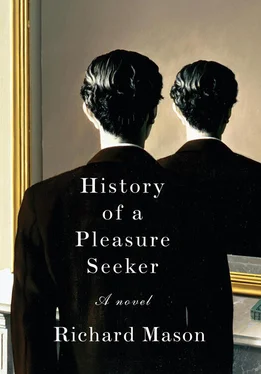It took three adults, including Maarten Vermeulen-Sickerts, to subdue Egbert and carry him into the house, away from the prying glances of the street. All Piet heard as he followed them was Jacobina’s shrill instruction: “To his bedroom! At once!”
He went there too, overcome by a contrition as sincere as it was practical; but Mr. Blok was playing sentry and would not let him pass. When he reached his own room he was thoroughly frightened. Perhaps he had sabotaged his future irreparably. How unbelievably maladroit. He rarely lost control, and as his anger drained it exposed the knowledge that his own vanity had brought about his downfall. His mother watched him from the bedside table. She had never shouted at him but expressed her displeasure with a regretful silence that now seemed to fill the room. He saw himself sent back to Leiden with no references, no hope of alternative employment in Amsterdam — for he could not bear the shame of encountering Constance and Louisa in another house, where he was another family’s servant. It would be better to leave the country altogether — but with what funds?
He ignored Didier’s knock and was relieved to be spared the embarrassment of consolation, but it took him a long time to fall asleep; and when he did, his dreams were full of taunting young women in elegant dresses.
Egbert did not calm down until he had submerged himself sixty-three times in a bath full of water and crushed ice. His mother held his hand while he did this and ordered more ice when he demanded it. Jacobina had helped Egbert through similar ordeals before and understood that intervention made things worse. She had never shared the details of these scenes with Maarten. Nor did she tonight when she placed their child’s freezing body in the soft sheets of their own bed, kissed him tenderly, and told him that he was safe and should sleep. Maarten Vermeulen-Sickerts had too much experience of rising to an occasion to look leniently on prolonged lapses of will. The knowledge that every one of the day’s guests would spend the next in rapt discussion of his family’s eccentricities inspired a searing shame, closely succeeded by the terror of the righteous man who knows he has offended his god.
The entertainment at Willemshoven had gone off so well that for several hours Maarten’s self-confidence had regained its customary solidity. Now he was reminded that life is full of unexpected humiliations. This knowledge, cut with a sympathy he did not think he should feel for the boy, much less display, ensured that the rising sun found him in an explosive temper.
So did the fact that Egbert, beset by writhing dreams, kicked like a mule all night.
Gert Blok opened Piet’s door the next morning, immediately after knocking, and was gratified to find his quarry still dressing for church. It was the first time he had seen Piet’s naked chest and he drank in every detail to enjoy at his leisure. He had not imagined that the young man’s arms bulged in quite the way they did when he reached for his shirt. He informed Piet, with extreme frostiness, that his presence was required in the study.
“Is he angry?”
“Beside himself.” As Gert Blok spoke, it came to him that this might be his last opportunity to catch Piet Barol half naked; indeed, it might be the last time he spoke to him at all. He knew his master in this mood. Blok’s desire for the young man disturbed him, almost made him hate him. But the prospect of never seeing Piet again was insupportable. “The important thing,” he said, “is that you should not attempt to justify yourself. I’ve known him more than twenty years. You acted very wrongly yesterday. Don’t pretend otherwise. It’s your only chance.”
For the next forty-five minutes, Piet followed the butler’s advice. He made no attempt to justify his actions, showed only the most passionate and rueful contrition, and endured Maarten’s torrent of damning accusation with the commitment of a flagellant. It worked. He left Maarten’s office, cheeks flaming but still employed; and as he climbed the stairs he reminded himself that he was not yet an equal of the family he served.
He had been barred from church and told to say his prayers with Egbert. He knocked at the boy’s door but received no answer. He closed his eyes, gathered himself, and went in. Egbert was sitting in his pajamas by the window. At his tutor’s appearance he assumed the expression Louisa reserved for errant milliners. Piet knew the boy deserved an apology; also that his own future in the household depended on winning his forgiveness — because Jacobina would never side with him against her son. Nevertheless, he found the prospect galling.
“Good morning, Egbert.”
“Good morning, Mr. Barol.”
“Would you like to say your prayers with me?”
Egbert went to the center of the room and knelt. He brought his hands together, closed his eyes, and set his mouth in an expression of unshakable severity. “I am ready.”
“Let us begin, then.”
The hour Piet spent with Egbert on a Sunday was usually the dullest of his week, because the reiteration of a service he had just sat through was tiresome. He found the events outlined in the Creed highly improbable and the defiant certainty of its register irritating. At least today he had been excused church and need only say the prayers once.
The boy’s expensive bedroom reminded Piet how inadequate his savings were to the requirements of a happy life in New York and emphasized the disadvantages of starting out as a plongeur or errand boy, living in slums full of Poles and Greeks and Irish. He turned from this thought and took the prayer book from the desk. “Would you like to read the Commandments?”
Egbert did not reply, so Piet read them himself. He usually took their devotions at a brisk pace but today he proceeded solemnly. At the injunction to honor your father and mother he remembered that he had only written twice to Herman Barol since his arrival in Amsterdam; then, with irritation, that neither of these letters had been answered. He pressed on. “You shall not commit adultery.” His conscience began to smart. “You shall not covet your neighbor’s house; you shall not covet your neighbor’s wife.”
When the Commandments were over, he turned to the psalm with relief, but its first verse was disquietingly relevant: “Truly God is good to the upright, to those who are pure in heart. But as for me, my feet had stumbled, my steps had well nigh slipped.” He felt watched and the reading from the Book of Job did little to ease his discomfort: “Let the day perish wherein I was born, and the night which said, ‘There is a man-child conceived.’ ”
By the time Piet Barol had finished the service, he felt more thoroughly chastised than he ever had in his life and his conscience stung with the knowledge that he deserved it. The sensation was extremely unpleasant. It meant, however, that his apology when it came was heartfelt. “I had no right to take you outside, Egbert,” he said meekly. “Perhaps I deserve to lose my place. I certainly will if you don’t forgive me.” He took the boy’s cold hand. “Please let me help you and make amends.”
Egbert had spent the day planning the banishment of Piet Barol. He had imagined Piet packing his possessions, carrying his suitcase down the stairs, returning to the hovel from which he had come. Egbert had the invalid child’s authority over his parents and knew he could have his tutor dismissed if he chose.
He had expected an apology and said nothing when it was made, because the prospect of punishing Piet was deeply soothing. But towards evening, as his temper subsided, so did the protection it provided against his wounded pride. He sat in his room, staring at the wall as though chained to it. Slowly a newer feeling began to twist through the ropes that bound him. Perhaps what Piet had done had been good for him. He had been outside now and proved empty the threats of the Shadowers.
Читать дальше












